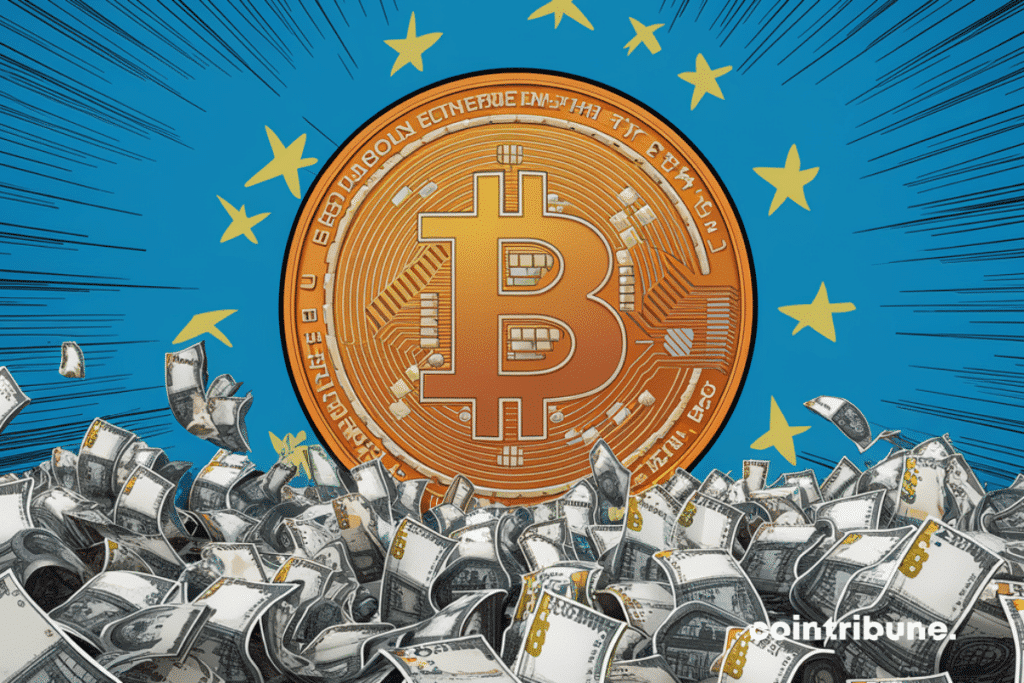📈 En 3 ans, les prix ont grimpé de +15,2% en moyenne selon Eurostat, avec +22% pour l'alimentation et +47,8% pour l'électricité et le gaz… pic.twitter.com/NvufVh0yVw
— Nicolas Teterel (@NTeterel) September 12, 2024
A
A
The ECB Opens The Credit Floodgates A Little More
Thu 12 Sep 2024 ▪
5
min read ▪ by
Getting informed
▪
Investissement
The European Central Bank has once again lowered its key interest rate. The increase in the money supply will accelerate again. A good omen for bitcoin.

The rate cuts continue
The ECB has once again lowered its key interest rate after a first cut in June. It is now set at 4%, down from 4.25% previously.
The markets expect the Fed to follow suit next week. That’s what the Fed chairman hinted at during his Jackson Hole speech.
Christine Lagarde stated that the ECB expects an average inflation rate of 2.5% in 2024, 2.2% in 2025, and 1.9% in 2026. That makes nearly 7% in total.
This would be better than the 17% cumulative inflation of the past three years in the eurozone. And nearly 20% for the entire EU.
Here are the inflation figures in France. In red is the overall “official” inflation… In blue is energy inflation and in green is food inflation:
If inflation seems tamed (for now…), a recession should also be avoided. Nor should there be a slip-up in public finances, hence the rate cuts.
Indeed, the bill is steep for governments. France, for example, borrowed at an average rate of 3.15% in 2023. This is much higher than in 2022 (1%), not to mention 2021, when the country borrowed for free.
Yet the French debt is not small. It exceeds 3,100 billion euros, or 110% of GDP. As a result, interest now amounts to 70 billion euros per year. Less in reality since the ECB holds about 25% of the European debt (~25% of the interest is therefore returned to the states).
Nonetheless, we are talking about tens of billions. We pay more in interest than for education or defense. The interest alone consumes all the income tax revenue.
Since 1974, interest has been responsible for 53% of the accumulated public debt of France. These 53% are represented by the blue curve in this graph:
PONZINOMICS
These interests are the reason why the fiat system is a ponzi. We borrow to repay. In short, we accumulate interest on interest, which is a mathematically exponential process.
Let’s repeat it. The fiat system is a ponzi. Every penny in circulation (dollar, euro, yuan, etc.) comes from a debt that is waiting to be repaid with interest. That’s why the amount of money in circulation MUST increase and will continue to increase.
The consequence is the loss of purchasing power of fiat money. The dollar has lost 97% of its purchasing power since 1913. It’s 40% for the euro since 2000.
The rate cuts mean that the total debt growth (households and businesses) and thus the amount of money in circulation will resume.
And given that we are reaching the physical limits of growth (peak oil), this money is preparing the bed for the next inflationary crisis. Our article on the subject: “Is bitcoin really magical”.
All this to say that long-term savings should not be kept in a bank account. You need to invest it in something safe. And nothing is safer than the limited supply of 21 million bitcoins.
And don’t count on retirement. Italy and Germany are already whispering 70 years…
“But bitcoin is too volatile,” you say? Then read the clear response from Michael Saylor.
Maximize your Cointribune experience with our "Read to Earn" program! For every article you read, earn points and access exclusive rewards. Sign up now and start earning benefits.
A
A
Bitcoin, geopolitical, economic and energy journalist.
DISCLAIMER
The views, thoughts, and opinions expressed in this article belong solely to the author, and should not be taken as investment advice. Do your own research before taking any investment decisions.